 For over a decade Celluloid Dreams, as launched and piloted by Hengameh Panahi, has been arguably the world’s foremost sales company for international cinema of an artistic nature and caliber. Tasteful, risk-taking, and shrewd, Panahi has been not only selling films, but developing and producing them as well, East, West, and in-between. At the creative helm in selecting, packaging, and marketing, she has been a welcome provocateur of public sensibility and a shepherd of artists new to the business of cinema. My notebooks are filled with my impressions of films in which she has played a hand. So when I plunge into the bees nest of the American Film Market (AFM) in Santa Monica, California, where every November over 500 films are screened in dozens of separate languages, I know that if I at least check out what Celluloid Dreams has to offer, I’ll be discovering something. Two such films that I found at the market this year were adaptations of literature, one from a tiny story and one from a full-fledged novel, and both of them probing the force of history in the present. These led me to note the comments of two avid spokesmen today, the first, a one-time history scholar and the second, a self-avowed book lover.
For over a decade Celluloid Dreams, as launched and piloted by Hengameh Panahi, has been arguably the world’s foremost sales company for international cinema of an artistic nature and caliber. Tasteful, risk-taking, and shrewd, Panahi has been not only selling films, but developing and producing them as well, East, West, and in-between. At the creative helm in selecting, packaging, and marketing, she has been a welcome provocateur of public sensibility and a shepherd of artists new to the business of cinema. My notebooks are filled with my impressions of films in which she has played a hand. So when I plunge into the bees nest of the American Film Market (AFM) in Santa Monica, California, where every November over 500 films are screened in dozens of separate languages, I know that if I at least check out what Celluloid Dreams has to offer, I’ll be discovering something. Two such films that I found at the market this year were adaptations of literature, one from a tiny story and one from a full-fledged novel, and both of them probing the force of history in the present. These led me to note the comments of two avid spokesmen today, the first, a one-time history scholar and the second, a self-avowed book lover.
One of our biggest living poets of the screen, writer-director Alexander Sokurov, insists that in literature — and in nothing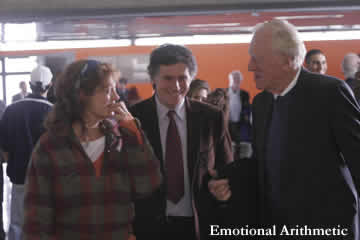 else and nothing less — lies the future of cinema. One of our most successful CEOs, Amazon’s Jeff Bezos, wants to light a cultural fire with “Kindle” as words fill screens the size of the old dime novel. At least according to these two, the written experience is here to stay as we continue to enter into the author’s world of words, story, and ideas. Well words on a page can tell us everything, but they show us next to nothing. We leave the visual delights and horrors, even mysteries, to cinema — so much so that a filmmaker’s Golden Rule is “Show, don’t tell.” Far North by Asif Kapadia follows that rule, but maybe not far enough. Whereas on the page the voice can give us vision, rarely does the voice work this way on the screen, where we rely on what we see (and on what we are not allowed to see) to carry the vision and the voice of the filmmaker. Even what is withheld or obscured from sight gains meaning on the screen, while what is said might easily escape our trust or persuasion. Far North’s truncated dialogue would seem to serve this maxim, but in the isolated majesty of the film’s frozen yet luminous landscape, the characters often speak in the clichéd one-liners of 21st-century action films. These clipped exchanges are cryptic without being portentous, defeating the wondrous effects of Sara Maitland’s minimal and miniature story, “True North,” a tale that offers (with not a word of dialogue) much to the cinematic imagination.
else and nothing less — lies the future of cinema. One of our most successful CEOs, Amazon’s Jeff Bezos, wants to light a cultural fire with “Kindle” as words fill screens the size of the old dime novel. At least according to these two, the written experience is here to stay as we continue to enter into the author’s world of words, story, and ideas. Well words on a page can tell us everything, but they show us next to nothing. We leave the visual delights and horrors, even mysteries, to cinema — so much so that a filmmaker’s Golden Rule is “Show, don’t tell.” Far North by Asif Kapadia follows that rule, but maybe not far enough. Whereas on the page the voice can give us vision, rarely does the voice work this way on the screen, where we rely on what we see (and on what we are not allowed to see) to carry the vision and the voice of the filmmaker. Even what is withheld or obscured from sight gains meaning on the screen, while what is said might easily escape our trust or persuasion. Far North’s truncated dialogue would seem to serve this maxim, but in the isolated majesty of the film’s frozen yet luminous landscape, the characters often speak in the clichéd one-liners of 21st-century action films. These clipped exchanges are cryptic without being portentous, defeating the wondrous effects of Sara Maitland’s minimal and miniature story, “True North,” a tale that offers (with not a word of dialogue) much to the cinematic imagination.
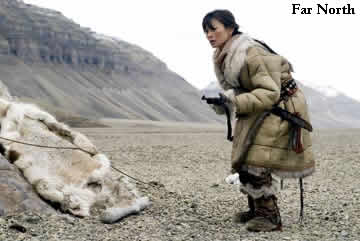 Reading the seven pages of “True North” is like savoring Isak Dinesen’s Winter’s Tales that are layered with legends and myths, coded and re-coded for meaning. “True North” is part parable, part ghost story, and part ethnography, all spun into an allegory of the heart. For the screen, I imagined it going the way of Claire Denis’ The Intruder (2004), a chilling adventure about the final (or endless) ramifications of patriarchy. Maitland’s is a hair-raising tale of envy and desire as these emotions enter a natural world of harmony and reciprocity, haunted by little more than the creaking of the icebergs breaking up or the dark of long nights. The equilibrium tips with the arrival of a man who, welcome as he is, brings into the remote Arctic habitat concepts and labels from somewhere else: the sexual dyad, beauty, ownership, commercial value. For him, humans (at least women) are on the same spectrum of exchange as property, whereas in the natural order they were part of the animal kingdom. Once a being in possession of the knowledge, skills, and talents needed for survival, a wife becomes a possession herself, a showpiece indicative of a man’s particular status. It’s as if Maitland places us at the turning point of Engels’ Origin of the Family, Private Property, and the State, so alien is the man’s way of life to the two women who had no need for names or mirrors, gender roles or hierarchies, let alone rivalries or jealousies. Yet how wondrously the writer paints their world.
Reading the seven pages of “True North” is like savoring Isak Dinesen’s Winter’s Tales that are layered with legends and myths, coded and re-coded for meaning. “True North” is part parable, part ghost story, and part ethnography, all spun into an allegory of the heart. For the screen, I imagined it going the way of Claire Denis’ The Intruder (2004), a chilling adventure about the final (or endless) ramifications of patriarchy. Maitland’s is a hair-raising tale of envy and desire as these emotions enter a natural world of harmony and reciprocity, haunted by little more than the creaking of the icebergs breaking up or the dark of long nights. The equilibrium tips with the arrival of a man who, welcome as he is, brings into the remote Arctic habitat concepts and labels from somewhere else: the sexual dyad, beauty, ownership, commercial value. For him, humans (at least women) are on the same spectrum of exchange as property, whereas in the natural order they were part of the animal kingdom. Once a being in possession of the knowledge, skills, and talents needed for survival, a wife becomes a possession herself, a showpiece indicative of a man’s particular status. It’s as if Maitland places us at the turning point of Engels’ Origin of the Family, Private Property, and the State, so alien is the man’s way of life to the two women who had no need for names or mirrors, gender roles or hierarchies, let alone rivalries or jealousies. Yet how wondrously the writer paints their world.
The poetic beauty of Sara Maitland’s prose is spellbinding, whereas in filmmaker Asif Kapadia’s hands, the story is simply a spell. Saiva is given a name for the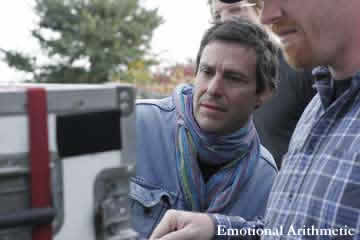 screen, and she is also given the back story of a shaman who cursed her with a sadistic touch despite her loving nature. On the screen Loki, the man, is nursed to health by Saiva, and he then dons the role of male protector (at least in theory) against an army of invaders who rape and kill. The tundra is now marked by time, or at least a vague 20th-century era, given the clothes, rifles, and visible lipstick on both women. The film becomes an allegory of war and conquest, at one grand remove from reality owing to the magical doom in which Saiva is cast, which will surely take a toll on Anja, now portrayed as her adoptive daughter. We get to see the spectacle of marauders, chase scenes in the tundra, a reindeer hunt, and a seemingly original cliff-hanging scene in an ice gorge (or did Mary Pickford or the Gish sisters endure that a century ago?). In any event, Michelle Yeoh’s Saiva is at least as virile as Sean Bean’s Loki, and Michelle Krusiec’s Anja as girly as the Gishes. If Kapadia had directed Far North with the awe and prescience he and co-writer Tim Miller introduced into the plot, the stunning visuals might speak for themselves (and the feats of shooting the film in a sub-zero climate would be rewarded). Maitland’s miniscule gem is haunting because it is all but ethnographic; Kapadia’s exotic epic is tedious because it tries to shock. With its breath-taking cinematography — or at least one that lets you feel the steam of your breath in the air — Far North shows what it should tell and tells what should remain unsaid. Flaherty’s Nanook conveys more mystery; Kurosawa’s Dersu Uzala, more poetry; Davaa and Falorni’s Weeping Camel, more gravitas.
screen, and she is also given the back story of a shaman who cursed her with a sadistic touch despite her loving nature. On the screen Loki, the man, is nursed to health by Saiva, and he then dons the role of male protector (at least in theory) against an army of invaders who rape and kill. The tundra is now marked by time, or at least a vague 20th-century era, given the clothes, rifles, and visible lipstick on both women. The film becomes an allegory of war and conquest, at one grand remove from reality owing to the magical doom in which Saiva is cast, which will surely take a toll on Anja, now portrayed as her adoptive daughter. We get to see the spectacle of marauders, chase scenes in the tundra, a reindeer hunt, and a seemingly original cliff-hanging scene in an ice gorge (or did Mary Pickford or the Gish sisters endure that a century ago?). In any event, Michelle Yeoh’s Saiva is at least as virile as Sean Bean’s Loki, and Michelle Krusiec’s Anja as girly as the Gishes. If Kapadia had directed Far North with the awe and prescience he and co-writer Tim Miller introduced into the plot, the stunning visuals might speak for themselves (and the feats of shooting the film in a sub-zero climate would be rewarded). Maitland’s miniscule gem is haunting because it is all but ethnographic; Kapadia’s exotic epic is tedious because it tries to shock. With its breath-taking cinematography — or at least one that lets you feel the steam of your breath in the air — Far North shows what it should tell and tells what should remain unsaid. Flaherty’s Nanook conveys more mystery; Kurosawa’s Dersu Uzala, more poetry; Davaa and Falorni’s Weeping Camel, more gravitas.
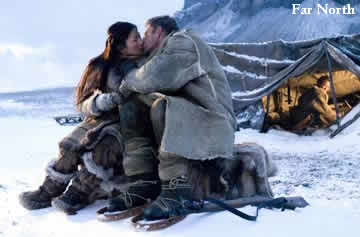 Moralist, feminist, fabulist, and theologian, Maitland crosses cultures freely on her own magic carpet, but when she lands, she mines the depths of our danger zones — envy, greed, covetousness, the lust of desire — and flags the courage needed, even if it serves to satiate ill will. The late Matt Cohen, once a professor of political philosophy and religion and also an author of children’s books, had a prolific career as a novelist and short story writer and was also an activist in seeking funds and rights for authors. So it’s not surprising that at the core of his novel, Emotional Arithmetic (1990) is a poet whose imagination and memory have been the targets of Nazi torture. The book is slated for re-issue in paperback in early 2008 in conjunction with the release of the film of the same title by Paolo Barzman, the son of American screenwriters who sought sanctuary in France during the McCarthy era. Barzman studied painting and assisted Jean Renoir in Los Angeles en route to becoming a filmmaker himself.
Moralist, feminist, fabulist, and theologian, Maitland crosses cultures freely on her own magic carpet, but when she lands, she mines the depths of our danger zones — envy, greed, covetousness, the lust of desire — and flags the courage needed, even if it serves to satiate ill will. The late Matt Cohen, once a professor of political philosophy and religion and also an author of children’s books, had a prolific career as a novelist and short story writer and was also an activist in seeking funds and rights for authors. So it’s not surprising that at the core of his novel, Emotional Arithmetic (1990) is a poet whose imagination and memory have been the targets of Nazi torture. The book is slated for re-issue in paperback in early 2008 in conjunction with the release of the film of the same title by Paolo Barzman, the son of American screenwriters who sought sanctuary in France during the McCarthy era. Barzman studied painting and assisted Jean Renoir in Los Angeles en route to becoming a filmmaker himself.
Emotional Arithmetic benefits from thoughtful casting of some fine talents in the mode of the intimate drama. With adroit sensitivity, they deliver dialogue that rings with historical and psychological resonance in calling up a common past the characters have each played out in their separate ways. Re-visiting that past would seem to be the task of David (Christopher Plummer), a history professor with a weak heart who’s been forced into retirement. But in this rather calculated screenplay, he has come to spurn the living history in his own household, manifest in his wife, Melanie (Susan Sarandon), who obsessively collects every document she can of human oppression, beginning with the Holocaust. As a child she was interned at Drancy, a way-station to extermination, and there, along with the boy Christopher (Gabriel Byrne), she was protected by the dissident writer Jakob (Max Von Sydow), who now, after subsequent confinement and abuse across nations, arrives at Melanie’s doorstep.
The once-in-a-lifetime reunion of the three at Melanie’s family table unleashes flashes of honesty rotating among the characters like lightning. David’s disdain of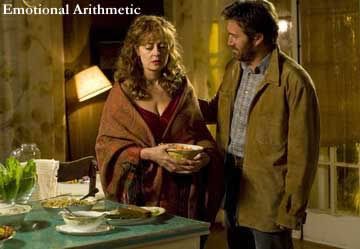 survivor favoritism and also the respectful fear of his son Benjamin (Roy Dupuis) of dredging up his mother’s traumas both open the door to history as a psycho-social present. Yet the film works best through its mutely cinematic approach to creating the narrative’s time and place on the screen. The past appears in black-and-white flashbacks or projections of character point of view with high-contrast lighting and extreme camera angles; the present arrives in softly sunlit autumn colors in a lushly idyllic setting, a hillside farm with an expansive view of a lake. Nature’s bounty rewards these lost souls who find their mooring in each other as the film succeeds in building new emotional spaces and filling them with feelings that surprise the characters themselves. The silence of the evening rain upon their abandoned table reminds us that the film has been flooded with words, but in the sense of the well-made play, they have found their place, washing away the hostilities and fragilities that were never recorded on the pages of Melanie’s notebook. Sarandon’s performance as wisely and justifiably loony rings true as usual, even if Von Sydow’s role of sacrificial generosity sells him a bit short. The nutmeg-spiced lamb and the tarte tatin we’ve seen the loving son prepare are still there for the taking, topping a feast of words and images alike.
survivor favoritism and also the respectful fear of his son Benjamin (Roy Dupuis) of dredging up his mother’s traumas both open the door to history as a psycho-social present. Yet the film works best through its mutely cinematic approach to creating the narrative’s time and place on the screen. The past appears in black-and-white flashbacks or projections of character point of view with high-contrast lighting and extreme camera angles; the present arrives in softly sunlit autumn colors in a lushly idyllic setting, a hillside farm with an expansive view of a lake. Nature’s bounty rewards these lost souls who find their mooring in each other as the film succeeds in building new emotional spaces and filling them with feelings that surprise the characters themselves. The silence of the evening rain upon their abandoned table reminds us that the film has been flooded with words, but in the sense of the well-made play, they have found their place, washing away the hostilities and fragilities that were never recorded on the pages of Melanie’s notebook. Sarandon’s performance as wisely and justifiably loony rings true as usual, even if Von Sydow’s role of sacrificial generosity sells him a bit short. The nutmeg-spiced lamb and the tarte tatin we’ve seen the loving son prepare are still there for the taking, topping a feast of words and images alike.

